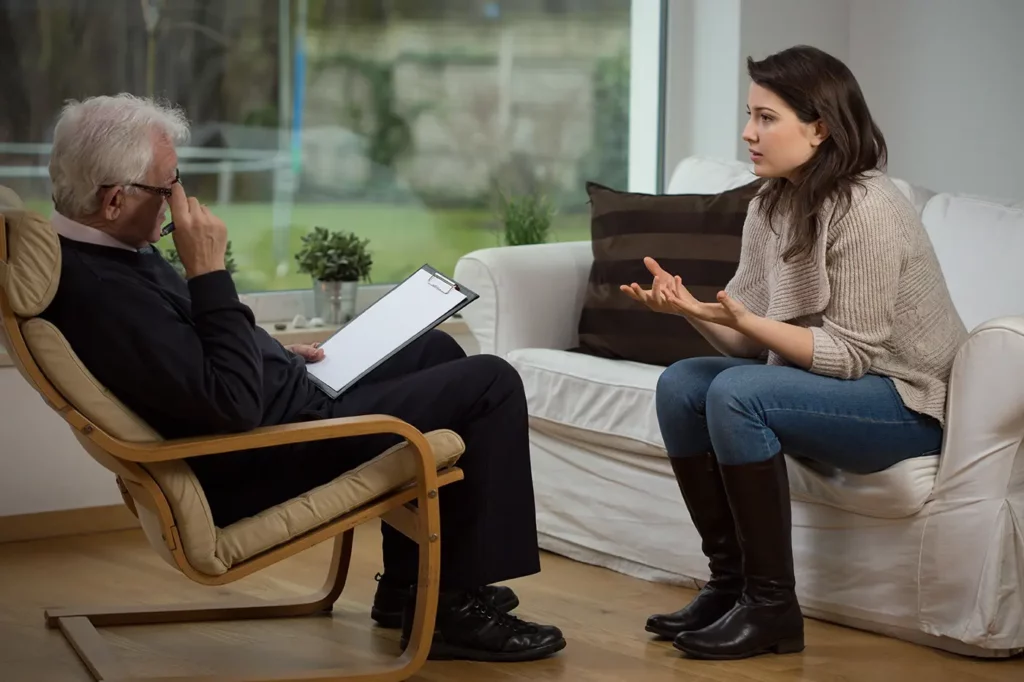24/7 Helpline:
(866) 899-221924/7 Helpline:
(866) 899-2219
Learn more about PTSD Treatment centers in Salt Lake County

Other Insurance Options

Self-pay options

Magellan

Anthem

Coventry Health Care

Cigna

GEHA

Sutter

Covered California

PHCS Network

UMR

Carleon

CareSource

Holman Group

Regence

Health Choice

Premera

Excellus

Horizon Healthcare Service

Amerigroup

BlueShield

Pinnacle Recovery
Pinnacle Recovery is Utah's best inpatient rehab for true healing, from the inside out. Pinnacle Rec...

Wasatch Recovery
Wasatch Recovery Treatment Center is a beautiful property and a sustained healing environment in its...

Liberty Addiction Recovery Centers | Rehab Center Salt Lake City
Liberty Addiction Recovery Centers offers addiction and mental health treatment for individuals in S...

DeNovo
DeNovo is a private rehab located in Salt Lake City, Utah. DeNovo specializes in the treatment of al...

Volunteers of America – Men’s Adult Detoxification Center
Volunteers of America - Men's Adult Detoxification Center is a social model detox program that focus...

CLD3 Counseling
CLD3 Counseling is a private rehab located in Salt Lake City, Utah. CLD3 Counseling specializes in t...

Project Reality
Project Reality is a private rehab located in Salt Lake City, Utah. Project Reality specializes in t...

Alpine Center
Alpine Center is one of the leading outpatient treatment centers in Utah. Alpine Center offers a wid...

Psychiatric and Behavorial Solutions
Psychiatric and Behavorial Solutions is a private rehab located in Salt Lake City, Utah. Psychiatric...

First Step House
First Step House, in Salt Lake City, Utah, is a comprehensive drug and alcohol rehab for adult men. ...

Tranquility Place of Utah
Tranquility Place of Utah - Substance Abuse Treatment is a private rehab located in Salt Lake City, ...

The Phoenix Recovery Centers – Women’s Residential
The Phoenix Recovery Centers - Women's Residential offer, through intensive treatment, the opportuni...

Odyssey House – 100 South
Odyssey House is a non - profit rehab located in Salt Lake City, UT. Odyssey House specializes in th...

Suncrest Counseling
Suncrest Counseling, in South Jordan, Utah, provides outpatient mental and behavioral health care fo...

Interface Psychological Services
Interface Psychological Services offers outpatient services to individuals struggling with mental he...

Ascendant Behavioral Health Clinics
Ascendant Behavioral Health Clinics offer mental health counseling for individuals struggling with a...

Primary Care Family Therapy Clinics
Primary Care Family Therapy Clinics is a private rehab located in West Jordan, Utah. Primary Care Fa...

Advanced Behavioral Counseling
Advanced Behavioral Counseling is a private rehab located in Salt Lake City, Utah. Advanced Behavior...

House of Hope
House of Hope is a private rehab located in Salt Lake City, Utah. House of Hope specializes in the t...

South Point Counseling Services
South Point Counseling Services is a private rehab located in South Jordan, Utah. South Point Counse...

Jordan West Family Counseling
Jordan West Family Counseling is a private rehab located in West Jordan, Utah. Jordan West Family Co...

Primary Childrens Hospital – Behavioral Health
Primary Childrens Hospital – Behavioral Health is a private rehab located in Salt Lake City, Utah. P...

Valley Mental Health – Residential Treatment
Valley Mental Health – Residential Treatment is a private rehab located in Salt Lake City, Utah. Val...

Discovery House
Discovery House - East 2100 South offers effective outpatient treatment that promotes holistic recov...

Renaissance Ranch – Men’s Residential
Renaissance Ranch Men's Residential is an Faith-based alcohol and Utah drug rehabilitation program. ...

Red Willow Counseling & Recovery
Red Willow Counseling & Recovery offers outpatient treatment for individuals with alcohol and/or sub...

Family Bootcamp – Therapy Associates
Family Bootcamp – Therapy Associates is a private rehab located in Salt Lake City, Utah. Family Boot...

Zion Healing Center
Zion Healing Center is a public rehab located in Salt Lake City, Utah. Zion Healing Center specializ...

Alpine Center for Personal Growth Substance Abuse Outpatient Treatment
Alpine Center for Personal Growth Substance Abuse Outpatient Treatment is a private rehab located in...





















































































































Saint Marys Center for Recovery
Saint Marys Center for Recovery is a private rehab located in Salt Lake City, Utah. Saint Marys Cent...

The Haven
The Haven Detox is a state of the art alcohol and drug rehabilitation center in Salt Lake City, Utah...

New Pathways Recovery and Wellness
Pathways at Centra provides comprehensive treatment for those struggling with drug and alcohol addic...

Journey Healing Centers
Journey Healing Centers, in Salt Lake City, Utah, is a luxury, 12 step-focused treatment center for ...

Valley Mental Health – Outpatient Clinic
Valley Mental Health – Outpatient Clinic is a private rehab located in Salt Lake City, Utah. Valley ...

Recovery Help
Recovery Help is a private rehab located in Salt Lake City, Utah. Recovery Help specializes in the t...

Accurate Accountability Outpatient
Accurate Accountability Outpatient is a private rehab located in Salt Lake City, Utah. Accurate Acco...

Clinical Consultants
Clinical Consultants is a rehab center that utilizes person-centered and evidence-based treatment to...

Odyssey House – 2100 South
Odyssey House – 2100 South is a non-profit rehab located in Salt Lake City, Utah. Odyssey House – 21...

Odyssey House – Fathers with Children
Odyssey House – Fathers with Children is a non-profit rehab located in Salt Lake City, Utah. Odyssey...

The Phoenix Recovery Centers – Men’s Residential
The Phoenix Recovery Centers - Men's Residential offer, through intensive treatment, the opportunity...

Assessment Counseling and Educational Services
Assessment Counseling and Educational Services is a non-profit rehab located in Salt Lake City, Utah...

Volunteers of America, Utah
Volunteers of America, Utah is a counseling clinic located in Salt Lake City, UT. Volunteers of Amer...

Sandy Counseling
Sandy Counseling is a private rehab located in Salt Lake City, Utah. Sandy Counseling specializes in...

Cold Creek Behavioral Health – Cold Creek Lodge
Cold Creek Behavioral Health - Loop Road is committed to helping individuals and families overcome a...

First Step House – Outpatient
First Step House – Outpatient is a private rehab located in Salt Lake City, Utah. First Step House –...

D7 Treatment Program
D7 Treatment Program is a private rehab located in West Jordan, Utah. D7 Treatment Program specializ...

Olympus Healing Center
Olympus Healing Center is a multi-disciplined center located in Salt Lake, Utah. Our focus is on per...

Amethyst Center for Healing
Amethyst Center for Healing is a private rehab located in Salt Lake City, Utah. Amethyst Center for ...

Polis Consulting
Polis Consulting is a private rehab located in Salt Lake City, Utah. Polis Consulting specializes in...

New Beginnings Behavioral Treatment Agency
New Beginnings Behavioral Treatment Agency is a private rehab located in West Jordan, Utah. New Begi...

1st Alliance Treatment Services – Downtown
1st Alliance Treatment Services - Downtown is located in Salt Lake City, Colorado. 1st Alliance Trea...

Ascend Recovery – Riley House Step 3
Ascend Recovery's evidenced based practices do not simply help patients graduate a residential progr...

NorthWest Passage
NorthWest Passage is a private rehab located in Salt Lake City, Utah. NorthWest Passage specializes ...

LifeMatters Counseling and Health Center
LifeMatters Counseling and Health Center is a private rehab located in Salt Lake City, Utah. LifeMat...

Ascend Recovery – Eagle View Step 2
Ascend Recovery's evidenced based practices do not simply help patients graduate a residential progr...

Family Pathways Cooperative
Family Pathways Cooperative is a private rehab located in West Jordan, Utah. Family Pathways Coopera...

1st Alliance Treatment Services – South
1st Alliance Treatment Services - South is located in Salt Lake City, Colorado. 1st Alliance Treatme...

Odyssey House – Adult Residential
Odyssey House, located in Salt Lake City, Utah, is a substance abuse program that addresses substanc...

Odyssey House – Mother With Children Residential
Odyssey House is co-occurring behavioral health and addiction rehab facility located in Salt Lake Ci...

UNI Downtown Behavioral Health Clinic
UNI Downtown Behavioral Health Clinic, in Salt Lake City, Utah, offers outpatient mental health care...

Odyssey House – Teen Residential
Odyssey House – Teen Residential is a drug and alcohol rehab located in Salt Lake City, Utah. They p...




































